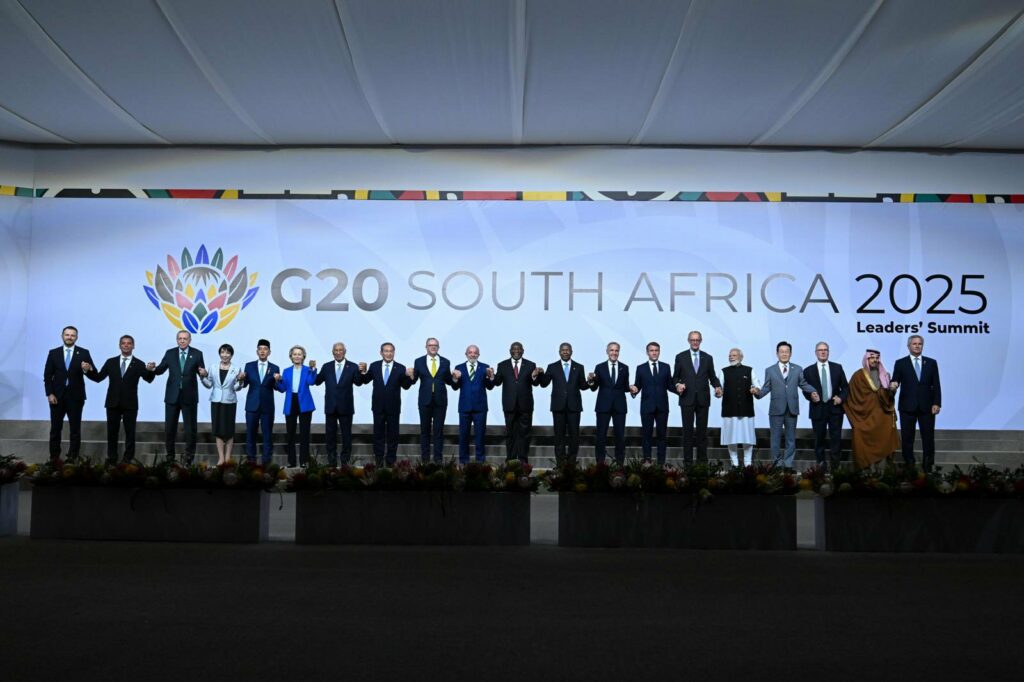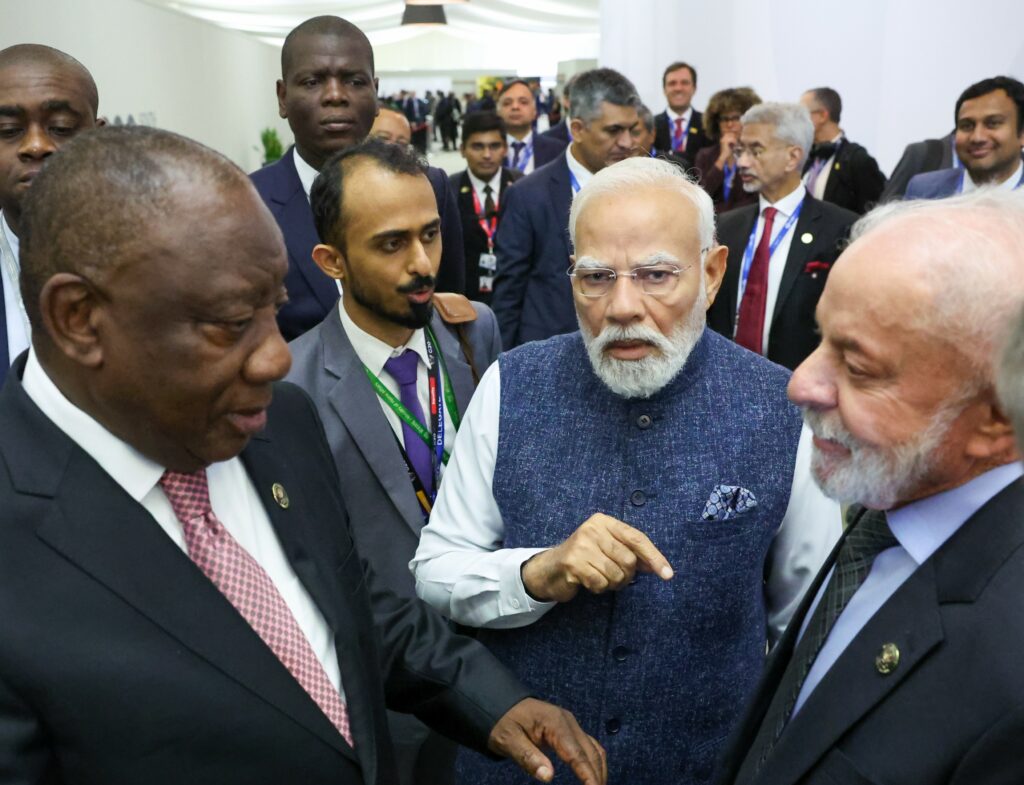
- India is pushing its way into the upstream debate on the issues of resource security and geo-spatial infrastructure by promoting what it calls as critical minerals circularity and open satellite data, which will present the next era of industrial and technological rivalry.
- It is this permanence that helps India to reinforce the argument that it can influence and not just observe global norm-making processes.
- Having the African Union as a full member of the G20, which is realised through a summit held in Africa, is beyond representational politics; it fundamentally changes the table set when global economic principles and responses to crises are negotiated.
- Following the successive presidencies of the Global South, the Johannesburg summit indicates a slow shift of world governance to a less Atlantic-centric core to more of a polycentric order.
The Indian Prime Minister, Narendra Modi, participated in the G20 Summit 2025 held in Johannesburg, South Africa, on 22 and 23 November 2025, the first summit to take place on the African continent, which has symbolic and strategic meaning for India, and led the new Global South as a whole. He showcased his Six-point agenda, which included security, health, skills, technology, and sustainable resources, going hand in hand with the agenda of the developing states, given that the African Union (AU) is fully involved in setting the architecture of the G20 groupings would be an architectural change in the manner the global economy is governed.
Agenda: Substance and Strategy: Agenda: Substance and Strategy by Modi
The six points projected by Prime Minister Narendra Modi can be interpreted as the effort to operationalize Global South issues into the functional agenda of the G20 instead of keeping them on the rhetoric level, i.e. the G20 Initiative on Countering the Drug-Terror Nexus, a Global Healthcare Response Team, the Africa Skills Multiplier programme, a Global Traditional Knowledge Repository, an Open Satellite Data Partnership and a Critical Minerals Circularity Initiative. All the pillars are rooted based on a particular gap in governance structure, the drug-terror initiative aims to institutionalise a rapid-response mechanism once the pandemic revealed the flaws of global health coordination; the health team aims to make Africa a long-term capacity-building partner rather than a trade or an investment partner; and the skills initiative aims to position India as a partner in long-term capacity-building, but not a trade or investment partner. Combined with these proposals, India is furthering its story of an India as a solutions provider who offers practical, scalable models to the table based on its experience in digital public goods, health schemes, and mass skilling.
This agenda can also be seen as a strategic one for the benefit of India. India is pushing its way into the upstream debate on the issues of resource security and geo-spatial infrastructure by promoting what it calls as critical minerals circularity and open satellite data, which will present the next era of industrial and technological rivalry. On the same note, the traditional knowledge repository and health response team will transform the soft power resources within India, like Ayurveda, millets and their pharmaceutical capacity into orchestrated multilateral platforms. Thus, it incorporates normative leadership (ethics, inclusivity, human-centric development) with hard economic and security interests, which uphold the image of India as a serious leader of the Global South, and not just as a spokesperson.
India takeaways: Assets and limitations

The summit brings India together on three paths: sustenance of its 2023 presidency results, an expansion of its strategic practices with Africa, and leveraging the usage of Mini-lateral forums such as IBSA in the G20 framework. Having made sure that issues like food security, climate resilience, disaster risk reduction, and digital public infrastructure, which were planted in New Delhi, were also advanced in Johannesburg. By doing this, India has proved that its presidency was not an isolated event but the beginning of a policy campaign. It is this permanence that helps India to reinforce the argument that it can influence and not just observe global norm-making processes.
The Africa-centric programs, in particular, the Skills Multiplier, represent a very obvious economic and geopolitical positioning where India tries to establish itself as a key player in the demographic transition of Africa, by giving skills, digital infrastructure and health cooperation rather than the purely extractive interaction. This may create preferential treatment for the Indian companies in the African markets. Gaining greater political goodwill in the multilateral forums and even gaining strategic representation against the Chinese infrastructure-intensive footprint on the continent. Simultaneously, the size of the promises that India has initiated to deliver, like as training a million trainers, developing a capacity of rapid health response or mobilising a critical minerals framework, will challenge the administrative capacity and financing powers of India. The risk of the narrative exceeding delivery due to implementation lag could take the edge off the diplomatic benefits.
African Union in the G20: Not Symbolic but Structural Shift
Having the African Union as a full member of the G20, which is realised through a summit held in Africa, is beyond representational politics; it fundamentally changes the table set when global economic principles and responses to crises are negotiated. To Africa, this forms an institutionalised pathway to drive agendas such as debt sustainability, fair energy transitions, climate finance and industrialisation, which had previously been on the backdrop in the previous G20 cycles. It even enables the AU to consolidate and project continent-wide stands, which may provide the African states with more bargaining power with creditors, energy corporations, as well as multilateral lenders.
It is a big diplomatic victory and a strategic opportunity for India. New Delhi was a firm supporter of the membership of the UN when it was in the presidency, and it now has a consistent institutional ally that can sympathise with most of its development issues and reform agenda. The inclusion of an AU next to the EU in the G20 will also enhance equal North-South representation in the G20, which will enhance concerted Indian-African demands on matters such as equitable debt structures, reformation of the global financial bodies and more equal climate funding. India is now able to operate through the two bilateral channels with the central African states, and through the continent channel through the AU, to enable it to build a multi-layered coalition.
Nevertheless, there are also complexities brought about by AU membership. Africa is extremely heterogeneous in political formations, economic organisation, and external orientation; getting to the point of cohesive formations in the AU and, subsequently, in the G20, will not necessarily go well with the preferences of India.
African and Indian interests might not align in cases of digital regulation or minerals governance on trade. The analytic implication is that although the convergence space of India-Africa cooperation is strong with the membership of the Union of African States, more advanced, long-term diplomacy is necessary instead of presuming that the countries will automatically converge.
Global Governance implications
Following the successive presidencies of the Global South, the Johannesburg summit indicates a slow shift of world governance to a less Atlantic-centric core to more of a polycentric order. With the help of the U.N. and in collaboration with India and South Africa, the G20 is socialising the ideas such as Ubuntu, integral humanism, and human-centred development into the vocabulary of international proclamations, quietly undermining purely market-based or GDP-based measures of development. This discursive change is important in that this will determine the parameters based on which policies on debt, climate, and technology will be evaluated.
Meanwhile, the summit also reveals the boundaries of this rebalancing. The presence of major power rifts, such as boycotts and partial participation of important Western actors, is an indication that the G20 is operating in a more fragmented geopolitical environment. India and Africa will push towards inclusivity and multilateralism by consensus will have to exist alongside increased geopolitical rivalry over AI, supply chain and security blocs. The critical point presented by this analysis is that South Africa, as G20, with the leadership of Modi as the representative of the Global South and the entry of the AU as the new member, demonstrates the opportunities as well as the limitations of how much and how quick the change can be implemented: the agenda is expanded, the actors are increased, yet the asymmetry of structural powers and the competition of great powers remain the limiting factors.
References:
- SA and India Deepen Cooperation to Advance Africa in G20-https://g20.org/track-news/sa-and-india-deepen-cooperation-to-advance-africa-in-g20
- PM Modi at G20 summit: 6-point agenda, AI safeguards, UNSC reforms | Key highlights-https://www.hindustantimes.com/india-news/pm-modi-at-g20-summit-6-point-agenda-ai-safeguards-unsc-reform-key-takeaways-of-his-address-101763898130401.html
- What happened at the G20 Summit in South Africa? Here are the key takeaways-https://indianexpress.com/article/upsc-current-affairs/knowledge-nugget-takeaways-of-g20-summit-upsc-exam-10382273
- G20 Summit: PM Modi outlines 3 key initiatives on knowledge, skills and drug-terror crackdownhttps://economictimes.indiatimes.com/news/international/world-news/g20-summit-pm-modi-outlines-3-key-initiatives-on-knowledge-skills-and-drug-terror-crackdown/articleshow/125503905.cms?utm_source=contentofinterest&utm_medium=text&utm_campaign=cppst
Parag Gilada is a Mukherjee Fellow who has recently graduated from the Jindal School of International Affairs with a keen interest in Sports Diplomacy. Views expressed are the author’s own.
